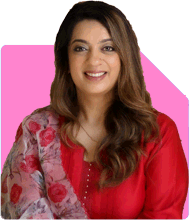Pooja Khera | Answer |Ask -Follow
Life, Relationship Coach - Answered on Jan 16, 2023
Dear Pooja, my husband and I share a very friendly relationship. When we have disagreements, we often tend to forget that our child is around. In the past few months, we have been arguing a lot and this seems to have taken a hit on our son. He is behaving strangely at school. He has got into trouble with other kids in his class and is often caught scribbling at his desk. He gets angry and throws tantrums in public. When we tried talking to him, he seemed normal but he did mention to the counsellor that even my mom and dad fight when they are angry. Since then we have mellowed down a bit. But how do we address this to our child?
You may like to see similar questions and answers below
Anu Krishna |1745 Answers |Ask -Follow
Relationships Expert, Mind Coach - Answered on Apr 12, 2023
Dr Deepa Suvarna |171 Answers |Ask -Follow
Paediatrician - Answered on Aug 22, 2023
Anu Krishna |1745 Answers |Ask -Follow
Relationships Expert, Mind Coach - Answered on May 22, 2024
Kanchan Rai |645 Answers |Ask -Follow
Relationships Expert, Mind Coach - Answered on Feb 09, 2025
Dr Dipankar Dutta |1837 Answers |Ask -Follow
Tech Careers and Skill Development Expert - Answered on Dec 05, 2025
Dr Shyam Jamalabad |108 Answers |Ask -Follow
Dentist - Answered on Dec 05, 2025
Dr Shyam Jamalabad |108 Answers |Ask -Follow
Dentist - Answered on Dec 05, 2025
Dr Shyam Jamalabad |108 Answers |Ask -Follow
Dentist - Answered on Dec 05, 2025
Dr Dipankar Dutta |1837 Answers |Ask -Follow
Tech Careers and Skill Development Expert - Answered on Dec 05, 2025
Ulhas Joshi |280 Answers |Ask -Follow
Mutual Fund Expert - Answered on Dec 05, 2025
Dr Dipankar Dutta |1837 Answers |Ask -Follow
Tech Careers and Skill Development Expert - Answered on Dec 04, 2025
Ravi Mittal |676 Answers |Ask -Follow
Dating, Relationships Expert - Answered on Dec 04, 2025
Anu Krishna |1745 Answers |Ask -Follow
Relationships Expert, Mind Coach - Answered on Dec 04, 2025
Anu Krishna |1745 Answers |Ask -Follow
Relationships Expert, Mind Coach - Answered on Dec 04, 2025




























